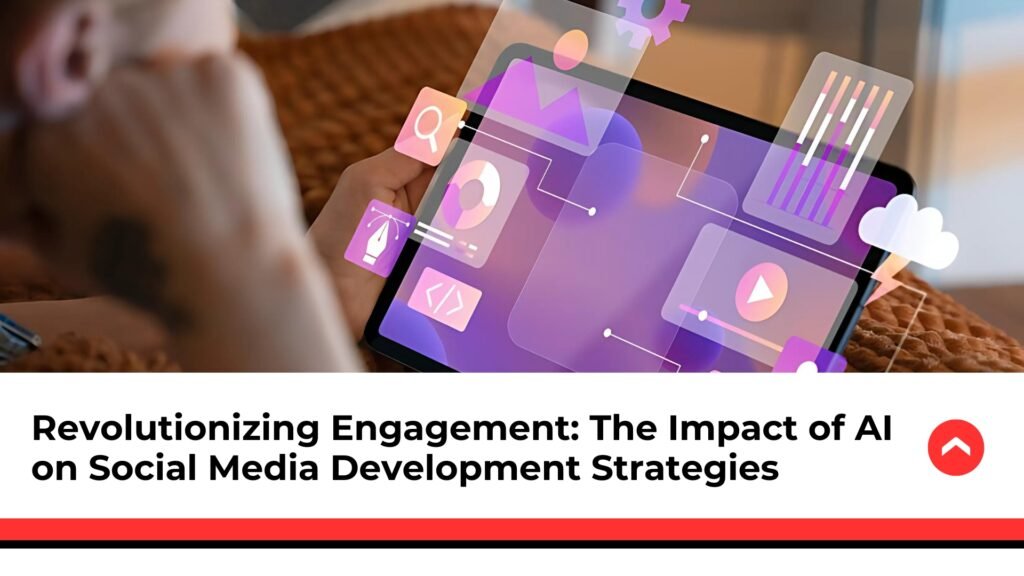Welcome to the media that changes at a thousand miles an hour – social media. This is an article dedicated to the use of artificial intelligence specifically in the development of social media presenting reasoning, technologies, and strategies. Due to the growing realization of businesses to engage their target customers directly, AI provides some changes that assist in speeding processes of carrying out some activities and the overall experience of the users. AI in social media development strategies is providing value and efficiency to the businesses in content creation and user engagement, for instance, through predictive content formulation to real time online customer assistance through chatbot services.
Besides, over time, the adoption of artificial intelligence is increasingly needed in order to compete on social media. Using AI will also help brands to analyze the behavior of the audience and improve the promotion activities of the brand and quickly respond to the changes. The subsequent portions of this paper will focus on the particular aspects of the usage of AI in social media, social media psychology for business, and advanced approaches to the application of these tools, which will help brands to run their engagement to a completely new level and achieve qualitatively new results.
Understanding AI in Social Media

Companies achieve this by providing greater insights into consumer behavior and preferences. Advanced technologies process vast amounts of data to identify trends, enabling businesses to tailor content and strategies to current demands. For instance, AI in social media development strategies systems can predict the best times to distribute insights, determine the most relevant content, and automate customer responses, eliminating the need for customers to contact representatives for answers.
Another aspect in which artificial intelligence can help is in creating personal experiences by showing ads and giving recommendations according to how the user interacts and his or her previous activities. Such high levels of flexibility and customization enhances user interaction and conversion rates as users are likely to create content that interests and appeals to them. The use of Ai tools will become instrumental in the social media marketing strategies of brands since the market is incredibly competitive, and the digital environment is rapidly changing.
Moreover, artificial intelligence makes social listening more efficient – a process whereby companies track and analyze conversations taking place online to know the public’s mood, spot new tendencies, and prevent potential PR crises from getting out of hand. In order to prevent deletion, marketers use AI in the company’s processes and analyze the dynamics of building brand presence by tracking short and long brand mentions, industry debates and competitors. As AI in social media development strategies keeps improving the social media strategy formulation processes, it will only take up more and more responsibilities concerning process automation, creativity and interaction enhancement in the future. Therefore, social media and corporate communication practices will constantly change and one must be able to, wisely apply the latest ideas on the use of artificial intelligence over the course of time.
Key Applications of AI in Social Media Development

The Implementation of AI in theDevelopment of Social Media within Companies requires careful planning and execution in order to harvest the maximum benefits from the technology. This is achievable by the integration of AI in social media development strategies in the organization as several opportunities arise for efficiency, personalization, and improved social media practice. In most cases, identifying the most important areas such as audience segmentation, content optimization and customer interaction will ensure that AI is utilized effectively.
Firms must begin with the identification of the area where AI can do the most good, i.e., whether it would be through automation tools for the reduction of the efforts involved in the posting process or by employing predictive analytics for making marketing decisions. Additionally, it is imperative to take up AI strategies that correspond to certain business objectives and evaluate the results obtained regularly to review the approach. This maintains the competitive advantage of organizations within the social media environment, resulting in continued growth and a more engaged audience.
1. Enhanced User Engagement
- AI technologies are revolutionizing how brands interact with their audiences:
- Chatbots: AI-driven chatbots provide instant responses to customer inquiries, improving engagement and satisfaction.
- Content Recommendations: Algorithms analyze user preferences to suggest relevant content, increasing the likelihood of interaction.
- Automated Responses: AI can automatically reply to comments and direct messages, ensuring timely communication and fostering better relationships with followers.
- Interactive AI Tools: Brands are using AI-powered tools such as quizzes, polls, and virtual assistants to engage users and personalize their experiences, increasing participation and brand loyalty.
By utilizing these AI-driven engagement methods, businesses can maintain active communication with their audience, reduce response times, and improve overall customer satisfaction, making the brand more accessible and approachable.
2. Advanced Analytics and Insights
AI’s ability to process large datasets allows for more precise insights into audience behavior. Through advanced analytics, businesses can go beyond surface-level metrics and truly understand their followers.
- Behavioral Tracking: AI can analyze user actions—such as likes, shares, and comments—to identify trends and predict what content will resonate.
- Demographic Analysis: AI tools can break down audience segments based on age, location, and interests, enabling businesses to tailor their messaging for specific groups.
- Competitor Analysis: AI can monitor competitors’ social media activities, identifying gaps and opportunities to outperform them.
By leveraging these advanced analytics and insights, businesses can fine-tune their social media strategies to better align with audience preferences and market demands.
3. Automated Content Creation
In addition to text and image generation, AI also enables video creation and editing tools that help streamline the production of dynamic content, such as short-form videos and stories, which are increasingly popular across platforms like Instagram, TikTok, and YouTube.
- Video Editing Tools: AI-powered tools like Lumen5 and Magisto can automatically create engaging videos from simple text inputs or existing footage, saving time and enhancing creativity.
- AI-Powered Design Tools: Platforms such as Canva and Adobe Spark use AI to help users design professional-quality graphics with ease, offering templates and design suggestions based on your content.
By incorporating AI into content creation, businesses can not only produce more engaging and diverse content but also maintain consistency and save valuable time, allowing for a stronger focus on strategy and engagement.
4. Targeted Advertising
AI enhances the precision of advertising efforts by delivering personalized and data-driven ads to the right audience at the right time, optimizing ad spend and performance.
- Dynamic Creative Optimization (DCO): AI allows for the automatic creation of personalized ads by tailoring the content, visuals, and messaging to individual users based on their behavior and preferences. This results in more engaging and effective ads.
- A/B Testing Automation: AI can run multiple ad variations simultaneously and determine which version performs best with different segments, optimizing campaigns without manual intervention.
- Lookalike Audiences: AI identifies potential customers who share characteristics with your existing audience, enabling businesses to expand their reach and acquire new customers more efficiently.
With AI-powered advertising tools, businesses can fine-tune their marketing campaigns, reduce wasted ad spend, and deliver more relevant content to their target audiences. These advancements lead to improved conversion rates and higher return on investment (ROI).
Benefits of Integrating AI into Social Media Strategies

When it comes to incorporating artificial intelligence in the social media signal, there are many benefits, which if wellutilized can help a brand to achieve its goals. For instance, one of the reasons why businesses leverage AI is because of the enhanced workflow as many repetitive activities like posting content, answering FAQs, and evaluating statistics are computerised. Such automation makes it possible for social media staff to spend the rest of their time on tactical and content creation activities. Also AI provides better usability with people by substituting these interactions with more personalized approaches.
Moreover, AI enhances decision-making underpinned by data. Since AI applications comb through a huge amount of data, they are capable of unveiling specific insights about the audience like their behavior, their feelings, or things that are trending. Therefore, brands are able to make intelligent content decisions to improve their strategies for the audience they want to reach. In the end, the use of AI in conjunction with social media management does not only bring about operational efficiencies but also enriches the experience for users and enhances interactions speeding up diverse business goals.
Last but not least, the incorporation of AI into the social media strategies is well encouraging the creativity. With AI evolving, Companies can try out new ideas and new ways of engaging their audiences, including but not limited to augmented reality activities and engaging content that they have not done before. Such innovations do not only give a competitive advantage to a brand, but it also helps the brand establish its dominance in the digital world. All in all, the prospects in redeploying social media strategies with AI pursuer most marketers are deeper than mere earning operational cost savings.
Conclusion
Overhauling Social Media Management, Artificial technology is using creativity and internationalisation to improve user experience, increase interactivity and in the process, collect vital information. Neuro-psycho doctoral research indicates that brand identity and image can be considerably enhanced up to interacting with an audience, as long as these new higher-order cognitive approaches are employed. In regard to this, the businesses will remain relevant in a cutthroat arena courtesy of artificial technology and they will meet their marketing needs more cost effectively and efficiently. At the present times, it is absolutely obvious that such tendency will only strengthen and develop further. Companies which are actively implement these technologies will be able to respond to transformed patterns and fancies of users more quickly. With artificial intelligence employed for tracking feedback, custom marketing approaches, and relevant new content, companies will achieve better audience engagement.
What is more, the introduction of AI into social media tactics augments the innovative behavior of organizations, prompting teams to venture into more novel concepts. While brands embark on using AI, this will also enable them to make better decisions as they will have proof for why particular strategies will be taken up. Last but not the least, advancement of social networks rests in proper application of AI technologies so that brands do not simply satisfy the needs of users, but exceed them. Companies that emphasize the need to accept artificial intelligence will ensure that they are at the ‘tip’ of the digital marketing industry and create a competitive advantage that will ensure healthy growth in the future.
Read More: Building a Winning Social Media Development Team: Strategies for Success and Growth
